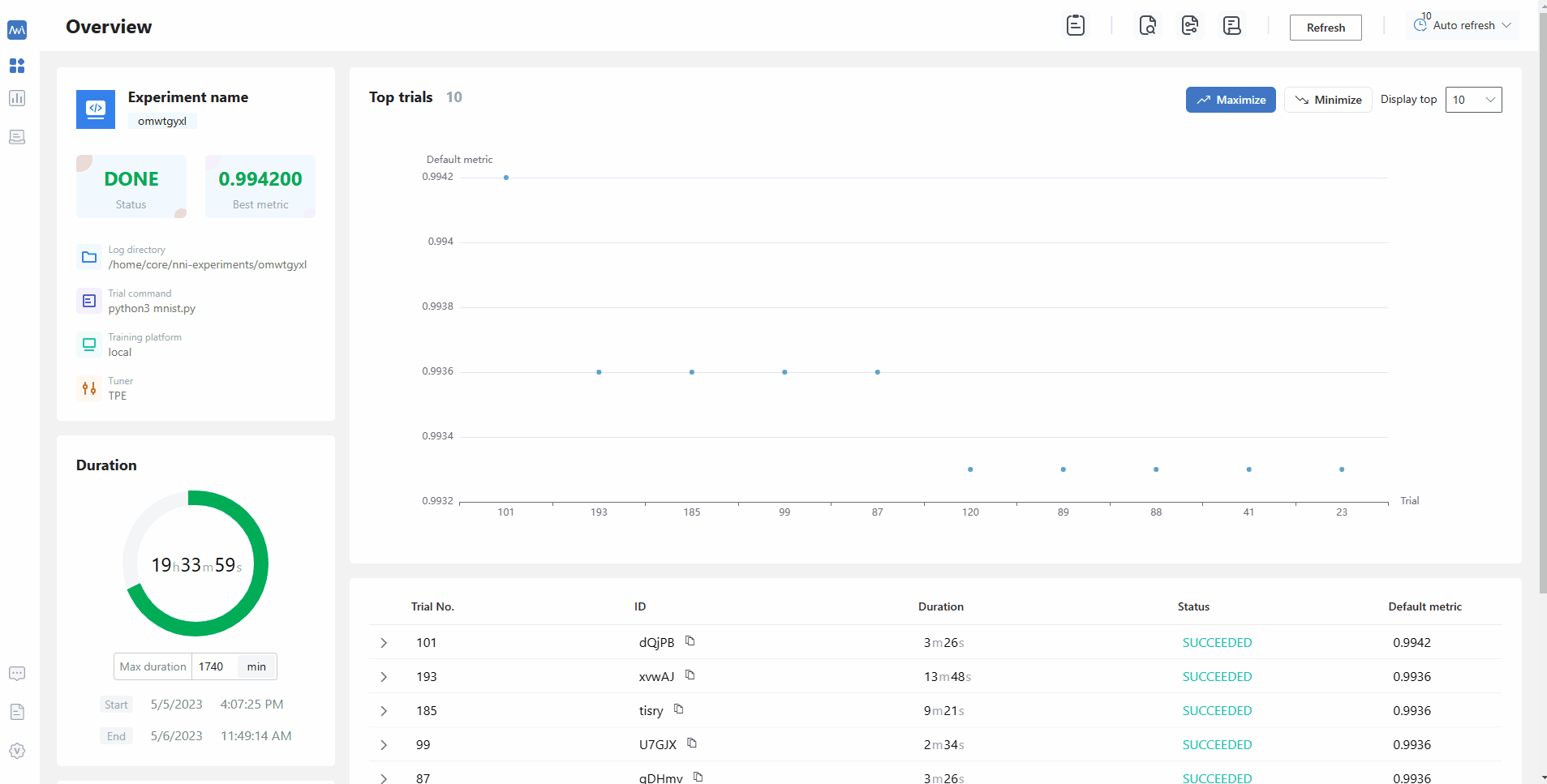NNI 文档¶
NNI (Neural Network Intelligence) 是一个轻量而强大的工具,可以帮助用户 自动化:
开始使用¶
安装最新的版本,可执行以下命令:
$ pip install nni
如果在安装上遇到问题,可参考 安装指南。
开始你的第一个 NNI 实验¶
$ nnictl hello
备注
你需要预先安装 PyTorch (以及 torchvision )才能运行这个实验。
请阅读 NNI 快速入门 以开启你的 NNI 旅程!
为什么选择 NNI?¶
NNI 使得自动机器学习技术即插即用¶
超参调优
params = nni.get_next_parameter()
class Net(nn.Module):
...
model = Net()
optimizer = optim.SGD(model.parameters(),
params['lr'],
params['momentum'])
for epoch in range(10):
train(...)
accuracy = test(model)
nni.report_final_result(accuracy)
模型剪枝
# define a config_list
config = [{
'sparsity': 0.8,
'op_types': ['Conv2d']
}]
# generate masks for simulated pruning
wrapped_model, masks = \
L1NormPruner(model, config). \
compress()
# apply the masks for real speedup
ModelSpeedup(unwrapped_model, input, masks). \
speedup_model()
模型量化
# define a config_list
config = [{
'quant_types': ['input', 'weight'],
'quant_bits': {'input': 8, 'weight': 8},
'op_types': ['Conv2d']
}]
# in case quantizer needs a extra training
quantizer = QAT_Quantizer(model, config)
quantizer.compress()
# Training...
# export calibration config and
# generate TensorRT engine for real speedup
calibration_config = quantizer.export_model(
model_path, calibration_path)
engine = ModelSpeedupTensorRT(
model, input_shape, config=calib_config)
engine.compress()
神经网络架构搜索
# define model space
- self.conv2 = nn.Conv2d(32, 64, 3, 1)
+ self.conv2 = nn.LayerChoice([
+ nn.Conv2d(32, 64, 3, 1),
+ DepthwiseSeparableConv(32, 64)
+ ])
# search strategy + evaluator
strategy = RegularizedEvolution()
evaluator = FunctionalEvaluator(
train_eval_fn)
# run experiment
RetiariiExperiment(model_space,
evaluator, strategy).run()
单尝试 (One-shot) NAS
# define model space
space = AnySearchSpace()
# get a darts trainer
trainer = DartsTrainer(space, loss, metrics)
trainer.fit()
# get final searched architecture
arch = trainer.export()
特征工程
selector = GBDTSelector()
selector.fit(
X_train, y_train,
lgb_params=lgb_params,
eval_ratio=eval_ratio,
early_stopping_rounds=10,
importance_type='gain',
num_boost_round=1000)
# get selected features
features = selector.get_selected_features()
NNI 可降低自动机器学习实验管理的成本¶
训练平台
一个自动机器学习实验通常需要很多次尝试,来找到合适且具有潜力的模型。 训练平台 的目标便是让整个调优过程可以轻松的扩展到分布式平台上,为不同的计算资源(例如本地机器、远端服务器、集群等)提供的统一的用户体验。 目前,NNI 已经支持 超过九种 训练平台。
多实验管理
深度学习模型往往需要多个实验不断迭代,例如用户可能想尝试不同的调优算法,优化他们的搜索空间,或者切换到其他的计算资源。 多实验管理 提供了对多个实验的结果进行聚合和比较的强大能力,极大程度上简化了开发者的开发流程。
获取帮助或参与贡献¶
NNI 使用 NNI GitHub 仓库 进行维护。我们在 GitHub 上收集反馈,以及新需求和想法。你可以:
新建一个 GitHub issue 反馈一个 bug 或者需求。
新建一个 pull request 以贡献代码(在此之前,请务必确保你已经阅读过 贡献指南)。
如果你有任何问题,都可以加入 NNI 讨论。
加入即时聊天群组:
Gitter |
微信 |
|---|---|

|

|
引用 NNI¶
如果你在你的文献中用到了 NNI,请考虑引用我们:
Microsoft. Neural Network Intelligence (version v3.0pt1). https://github.com/microsoft/nni
Bibtex 格式如下(请将版本号替换成你在使用的特定版本):
@software{nni2021,
author = {{Microsoft}},
month = {1},
title = {{Neural Network Intelligence}},
url = {https://github.com/microsoft/nni},
version = {2.0},
year = {2021}
}

